|
|
|
Sort Order |
|
|
|
Items / Page
|
|
|
|
|
|
|
| Srl | Item |
| 1 |
ID:
134217
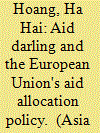

|
|
|
|
|
| Publication |
2014.
|
| Summary/Abstract |
This paper analyses the motivation determining the European Union's (EU) aid allocation to Vietnam. Existing literature and EU official documents are used to build upon four models with respect to new aid allocation: donor interest, recipient interest, recipient capacity and potential donor influence. The paper concludes that the EU's aid policy in Vietnam has a long-term objective in conformity with Vietnam's development strategy-poverty alleviation. Moreover, the EU's political and economic interests, a successful economic reform and development strategy, a high level of ownership (good governance) and potential donor influence are identified as contributions to make Vietnam an 'aid darling'.
|
|
|
|
|
|
|
|
|
|
|
|
|
|
|
|
| 2 |
ID:
121759
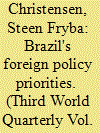

|
|
|
|
|
| Publication |
2013.
|
| Summary/Abstract |
As Brazil has risen to become an increasingly significant regional and global player in a world undergoing significant transformations in terms of power balance, the subject of its aims, world-view and foreign policy strategies is becoming increasingly relevant. This article focuses on the most important themes and priorities in Brazil's foreign policy orientation between 2003 and 2012 and connects these to the Brazilian government's world-view, its view of Brazil's role in the world, and to the main aims pursued by Brazil in its overall development strategy. I discuss how Brazil's view of the world and its foreign policy priorities relate to the USA's view and preferences, arguing that Brazil's foreign policy priorities reflect the fact that the USA and the West in general are often seen as barriers to Brazil's main aims. These are to achieve economic strengthening, a growing influence on the international political scene and a leadership position in South America, and through this to contribute to major changes in the global order.
|
|
|
|
|
|
|
|
|
|
|
|
|
|
|
|
| 3 |
ID:
124212
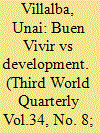

|
|
|
|
|
| Publication |
2013.
|
| Summary/Abstract |
The concept of development and the ways of achieving it have been widely criticised from various viewpoints. In the face of the apparent obsolescence of long-standing models, the novel Buen Vivir approach (roughly translated as 'living well' or 'good living'), which has arisen in different parts of Latin America, may offer an alternative paradigm. However, the implementation of policies that could lead to this Buen Vivir model requires profound changes that follow a range of complex transitions, which may often even seem contradictory in countries like Ecuador, where this approach has already been enacted in the new constitution and laws but where old development practices still continue. Accepting the plurality of visions on Buen Vivir (from the indigenous ontology to the 'Western-modern' approach), while at the same time positing common ground in which to define a new development strategy able to overcome a natural resource extraction-based economic pattern, is one of the immediate challenges.
|
|
|
|
|
|
|
|
|
|
|
|
|
|
|
|
| 4 |
ID:
112200


|
|
|
| 5 |
ID:
035435


|
|
|
|
|
| Publication |
Boulder, Westview Press, 1988.
|
| Description |
vi, 402p.pbk
|
| Series |
Westview Special Studies on China and East Asia
|
| Contents |
Vol. II.: Economy, society, and technology
|
| Standard Number |
0813374235
|
|
|
|
|
|
|
|
|
|
|
|
Copies: C:1/I:0,R:0,Q:0
Circulation
| Accession# | Call# | Current Location | Status | Policy | Location |
| 030278 | 951.05/SHA 030278 | Main | On Shelf | General | |
|
|
|
|
| 6 |
ID:
121547
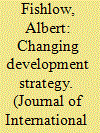

|
|
|
|
|
| Publication |
2013.
|
| Summary/Abstract |
Latin America experienced high rates of growth in the first decade of the twenty-first century. Will the region-increasingly split into Atlantic and Pacific countries with different policies-be able to continue this pace into the future? That will depend upon high rates of investment, regulatory stability, and openness to technological advancement to sustain gains in productivity and permit continued improvements in income distribution.
|
|
|
|
|
|
|
|
|
|
|
|
|
|
|
|
| 7 |
ID:
189312


|
|
|
|
|
| Summary/Abstract |
The present study identifies investment in Africa’s cultural and creative industries (CCIs) as one of the strategic moves in the right direction for achieving sustainable development across the African continent. Cultural and creative industries (CCIs) offer an alternative approach to development through their wealth creation potential, socioeconomic development, employment opportunities, and promotion of cultural diversity. Nevertheless, CCIs are yet to feature categorically as a development strategy, owing to their many challenges, as indicated by the study. The study submits that partnerships under the Belt and Road Initiatives (BRI) could offer an alternative source of mobilizing support for CCIs, as the BRI is a development framework with robust financing, infrastructure, and human resources development. However, it will require the pragmatic support of policymakers to leverage BRI and boost the expansion of CCIs in Africa.
|
|
|
|
|
|
|
|
|
|
|
|
|
|
|
|
| 8 |
ID:
186604
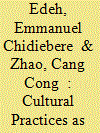

|
|
|
|
|
| Summary/Abstract |
China’s One Belt One Road (OBOR) centres on building a harmonious world, by reorienting the already tumultuous international community, towards the path of sustainable, peaceful and harmonious coexistence. From a cultural perspective, the OBOR is a heritage, an embodiment of brilliant civilization, glorious historic past and extraordinary creativity of mankind. It harbours both tangible and intangible representations of the values, beliefs, traditions and lifestyles of prior generations that are valuable to the present generations. Evidence of historical socioeconomic development and intricacies thrived on the exchange of cultural values shared by all mankind. By drawing from diverse conceptual frameworks embedded in traditional Chinese cultural values, the study offers an insightful illustration of cultural practices in contemporary China’s socioeconomic development through the OBOR. Capturing how cultural values underpins the socioeconomic development pattern in OBOR, geopolitical decisions and actions aimed at managing conflicts and the inclusive nature of OBOR.
|
|
|
|
|
|
|
|
|
|
|
|
|
|
|
|
| 9 |
ID:
103306


|
|
|
|
|
| Publication |
2011.
|
| Summary/Abstract |
Developing countries vary dramatically in the amount they spend on social insurance. We establish a theoretical framework linking autarkic post-World War II economic development strategies with the emergence of insurance-based social policies. We argue that a government's choice of development strategy is conditioned by the size of the domestic market, relative abundance of labor, and land inequality in the context of a closed international trading system. The development strategy in turn shapes the fiscal priority governments place on social insurance. Contrary to the compensation hypothesis prominent in studies of the rich democracies, protectionist countries emphasize social insurance. Empirical analysis finds support for our argument. The results suggest that economic policies in the 1950s, 1960s, and 1970s had important implications for the emergence and current contours of social policy in the developing world. These differences in priorities swamp recent within-country changes.
|
|
|
|
|
|
|
|
|
|
|
|
|
|
|
|
| 10 |
ID:
131947
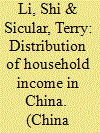

|
|
|
|
|
| Publication |
2014.
|
| Summary/Abstract |
Income Theory
Public Distribution
China
Chinese Economy
Poverty
Politics
Social Reforms
Inequality
Gini Sufficient
Household Survey
Distribution Theory
Distribution Politics
Development Strategy
International Standard
Urbanization
Urban Poverty
Rural Poverty
|
|
|
|
|
|
|
|
|
|
|
|
|
|
|
|
| 11 |
ID:
079572


|
|
|
|
|
| Publication |
2007.
|
| Summary/Abstract |
The World Bank has undergone tremendous change recently. One crucial innovation is its initiative to raise social development to the level of core issue within its development strategy. While the Bank has always been concerned with social issues, the meaning and operational significance of social has changed over time. Using a content analysis of relevant World Bank documents, I distinguish three periods where the meaning of social has changed. The article's main objective is to explain this change in the Bank, allowing us to answer questions about the conditions for policy change in international organizations. Is the World Bank merely adapting to the outside world, or is it engaging in innovative behavior? The case study reveals an alternative explanation for policy change in IOs other than either external pressure or internal advocacy. It shows that external and internal triggers are related and reinforce each other
|
|
|
|
|
|
|
|
|
|
|
|
|
|
|
|
| 12 |
ID:
137188
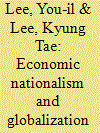

|
|
|
|
|
| Summary/Abstract |
In this article we explore whether South Korea's long-standing tradition of economic nationalism remains an appropriate development strategy, or whether this approach has been rendered irrelevant by the current wave of neoliberal globalization led by multinational corporations. We examine the changed economic agendas of each Korean regime, with a particular focus on national identity and economic nationalism, mobilized and implemented by the state. We argue that, despite the rapid development of globalization and cosmopolitanism in South Korea, economic nationalism is still prevalent. Korea's adoption of neoliberal economic activities, such as lifting trade barriers to encourage the inflow of foreign direct investment, was necessary to assist certain areas of the economy. Furthermore, changing the direction of the growth trajectory remains subordinate to the goal of state building. Empirical analysis of results collected from survey data and one-on-one interviews conducted in 2010 help to validate our hypothesis.
|
|
|
|
|
|
|
|
|
|
|
|
|
|
|
|
| 13 |
ID:
127050


|
|
|
|
|
| Publication |
2013.
|
| Summary/Abstract |
Central and Eastern European (CEE) countries are undergoing a transition from one socio-economic system to another. Individuals, communities and societies are in a state of continuous transformation necessitated by the globalization of markets and changes in basic traditional behavioral modes, primarily economic ones. The changes necessitated by systemic transition, on the one hand, and those determined by the logic of globalization (for CEE countries the process also means regional unification as they integrate into the European market), on the other, will hardly be agreeable and smooth.
In most CEE countries, the state still remains not only a most influential economic actor but, in fact, also the dominant and, in some cases, hegemonic one. The share of the gross domestic product redistributed through budgets of all levels is still high. Governments have large property and actively pursue their economic interests by establishing new laws.
|
|
|
|
|
|
|
|
|
|
|
|
|
|
|
|
| 14 |
ID:
132570


|
|
|
|
|
| Publication |
2014.
|
| Summary/Abstract |
After decades of isolation, Myanmar is now actively re-engaging with the global economy. For successful re-engagement, Myanmar needs to implement comprehensive economic reforms based on a shared vision of long-term economic development characterized by human-centred, sustainable, pro-poor, inclusive, high and balanced economic growth. In this paper, we propose five growth strategies: an "Agriculture Plus Plus" strategy; an export-oriented strategy; a foreign direct investment driven strategy; a two-polar growth strategy; and a domestic economic corridors development strategy. These strategies are used as guides to translate wide-ranging development agendas into a set of implementable policies, programmes, and projects.
|
|
|
|
|
|
|
|
|
|
|
|
|
|
|
|
| 15 |
ID:
120912
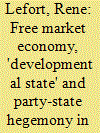

|
|
|
|
|
| Publication |
2012.
|
| Summary/Abstract |
Ethiopia's development strategy rests on the promotion of a market economy, driven by 'new entrepreneurs', both urban and rural, while, to bring it to 'maturity' and to compensate for its present 'failures', the resolute intervention of a 'developmental state' is essential. Simultaneously, the ruling party aims to sustain its political hegemony by enrolling massively among those at the top of the social pyramid, to which most of these 'new entrepreneurs' belong, so as to build its new constituency on them. In the rural areas (83% of the population), the merger of these two objectives leads to the mobilisation of the upper group of smallholder farmers, recruited both as 'model farmers' to become the engine for the growth, notably with the support of a massive public Agricultural Extension Programme, and also as members of the ruling party. However, the subordination of the regime's economic objectives to its political agenda undermines the implementation of its development strategy at the field level. This raises questions about the efficiency of the programme and the room left for entrepreneurship, even though this is a mainstay of the market economy that the regime sees as 'vital' for Ethiopia's 'survival' (Meles 2006).
|
|
|
|
|
|
|
|
|
|
|
|
|
|
|
|
| 16 |
ID:
099055


|
|
|
|
|
| Publication |
2010.
|
| Summary/Abstract |
This article challenges popular claims about the capacity for microfinance to reduce poverty and empower women in the global South. Instead, I posit microfinance as a contradictory development tool, one that creates possibilities for both the contestation and continuation of unequal social relations at multiple scales. The article is divided into two major sections. I begin by examining the assumptions embedded in mainstream financial mappings of global space since the 1980s. In particular, I show how they privilege the transnational mobility of corporate capital and elide the everyday, place-based work of social reproduction. I examine the expansion and commercialisation of microfinance in this context, as an alternative mechanism for enabling poor households to continue meeting their everyday needs by taking on more debt. In the second section, I draw on fieldwork in Andhra Pradesh, India, to show how these interlocking macro/micro financial flows interact with regional social histories to shape and differentiate people's mobility 'on the ground' according gender, caste, and class. I conclude by suggesting how a critical geopolitics framework can help formulate new questions about microfinance as a development strategy.
|
|
|
|
|
|
|
|
|
|
|
|
|
|
|
|
| 17 |
ID:
075341


|
|
|
|
|
| Publication |
2006.
|
| Summary/Abstract |
This article will engage in a brief survey of the geopolitical impediments to development in the Democratic People's Republic of Korea (DPRK). One cannot comprehend the present without understanding the thread which runs from the past to the present. Even a perfunctory knowledge of regional geography will highlight that the DPRK lies at the intersection of China-Russia-Japan and US interests. The central issues in the DPRK's developmental strategy are (1) state/regime survival and (2) resource allocation. In its earliest days the administration of Kim Il Sung was bedevilled by two alternative factions within the Workers Party: the Irkutsk faction beholden to the patronage of the USSR, which opted for and lost a leadership struggle in 1955, and the Yan'an faction of Chinese-oriented veterans. Once Kim Il Sung's power was consolidated, the primary adversary was and remains the United States and its ally Japan. Cumulatively both of these historical experiences have resulted in a total distortion of resource allocation; in the first instance because of the need to establish an independent identity, mooting the juche concept as its focus; and in the second, because of military expenditure of Herculean proportions. Reportedly 25 to 30 per cent of the population is either in the Korean People's Army or the Red Militia.
|
|
|
|
|
|
|
|
|
|
|
|
|
|
|
|
| 18 |
ID:
131350
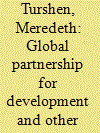

|
|
|
|
|
| Publication |
2014.
|
| Summary/Abstract |
This article revisits the United Nations Millennium Development Goals (mdgs) set in 2000, timely now because policy makers are currently making plans for the period after 2015. After laying out a critical analysis of the mdgs, the article focuses on Millennium Goal 8, the global partnership for development. The argument made is that the absence of any goal to reset the asymmetrical power relations between the North and the South reveals the limitations of the endeavour. The pharmaceutical industry is discussed in detail because mdg8/Target 6 deals with access to affordable, essential drugs in developing countries. This target seems emblematic of a problem found throughout the millennium project: the unaddressed need for real economic development. Target 6 exemplifies both North-South and public-private conflicts of interest, which are carefully hidden in official documents behind the euphemism of 'partnership', as if countries of such unequal power could be partners.
|
|
|
|
|
|
|
|
|
|
|
|
|
|
|
|
| 19 |
ID:
128902
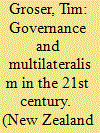

|
|
|
| 20 |
ID:
131356


|
|
|
|
|
| Publication |
2014.
|
| Summary/Abstract |
This paper explores recent efforts to ensure the participation of indigenous peoples in the making of the post-2015 development agenda. It is based on an examination of the UN's global consultation process, conducted between July 2012 and July 2013. Using discursive analysis of consultation findings and reports, we argue that the UN's approach to participatory development represents a pretence rather than an actual shift in power from development experts to the intended beneficiaries of development. Therefore the post-2015 consultation process aptly illustrates the recurring tyranny of participation, this time at a global level, as the UN maintains control over global development goals. Recognising that it would be unjust to ignore the ability of marginalised groups to challenge the UN's dominant narratives of development, we suggest that there is still time for indigenous voices to be heard in the build-up to the post-mdg era through 'invited' and 'uninvited' forms of participation.
|
|
|
|
|
|
|
|
|
|
|
|
|
|
|
|
|
|
|
|
|